She Won (Get Over It)
So Why Did the Law Force Doreen Farr to Spend $550,000 Defending Her 3rd District Seat?
“Defendant” means that person whose election or nomination is contested or those persons receiving an equal and highest number of votes, other than the contestant, where, in other than primary elections, the body canvassing the returns declares that no one person has received the highest number of votes for the contested office. — California Elections Code, Section 16002
And with that, Doreen Farr was on the hook.
Farr won the 3rd District Supervisor seat in the November 4, 2008, election. Strongly endorsed by liberal groups, she canvassed hard, raised $639,472, and won by a respectable 806 votes out of more that 35,000. Since then, no one has ever alleged that Farr stuffed the ballot box, manipulated votes, cheated, lied, or personally did anything else wrong during the election or her candidacy. Nevertheless, since then, she has been on the hook, spending roughly $550,000 to defend the validity of that election. That’s how the law is written when there is a disputed election … Some law, some hook.
Losing Is Tough
Her opponent Steve Pappas — an independent from the Santa Ynez Valley — also ran a well-financed (raising $581,963), strong campaign, canvassing vigorously in Isla Vista and UCSB. The student paper, the Daily Nexus, endorsed him in the June primary and again in November. But he lost badly to Farr in all 18 Isla Vista and UCSB precincts. “He felt he should’ve had more votes and didn’t,” Farr said recently.
Almost immediately, Pappas focused on what seemed to him quite peculiar: In four precincts in I.V. and UCSB, the voter turnout appeared to be more than 100 percent — one exceeded 130 percent. To an untrained eye, this would look funny.
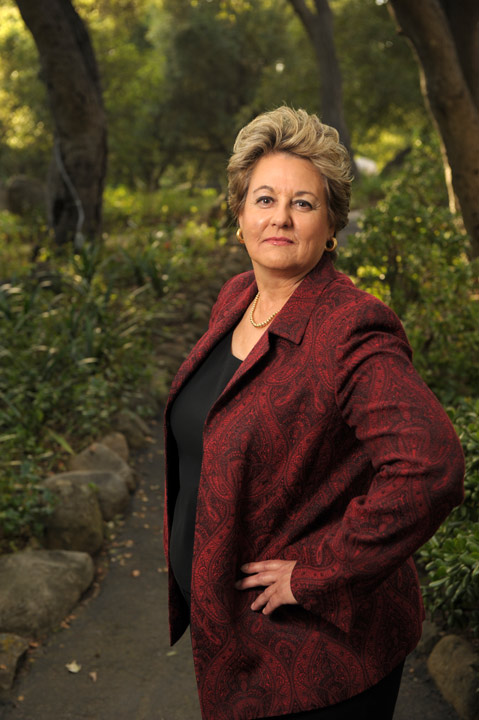
There was an easy explanation, according to county elections chief Joe Holland, whose county hats include Clerk, Recorder, Assessor, and Registrar of Voters. As he explained many times, including in this paper, the Isla Vista and UCSB population is filled with transient students who move from year to year within the community. When they go to vote, they occasionally show up at the wrong polling places. When they do, they fill out a provisional ballot, which becomes part of the Election Day “turnout.” These ballots aren’t actually counted as votes until later, after election officials can ensure a person is properly registered, not voting twice, and that everything is aboveboard. Taking a step back, the numbers appear to balance out: Election turnout in those 18 Isla Vista and UCSB precincts was 89.9 percent, while district-wide the turnout was just a bit lower, at 88.7 percent. “It’s like old news that you have to explain over and over again,” Billie Alvarez, deputy director of elections for the county, said recently.
This explanation, however, wasn’t good enough for Pappas. Either he didn’t like the answer given to him, or it didn’t matter. With his lawyer, he sat down and shuffled through voter cards and registration records, all provided to him by the Registrar of Voters office. Not satisfied, he demanded a recount, a request immediately granted by Holland, who was eager to show the process was transparent and fair. In the end, Pappas gained one vote. Farr remained the winner.
But Pappas was still not satisfied.
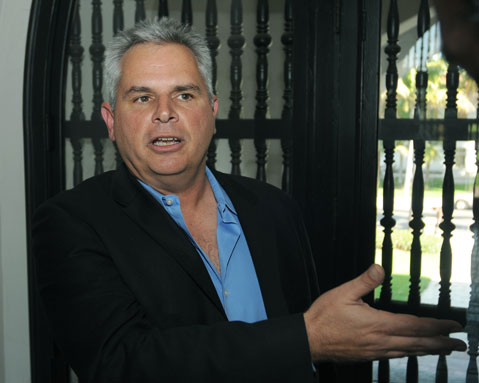
A District Divided
The 3rd District of the County of Santa Barbara is the connecting piece between north and south counties, spanning the Santa Ynez Valley, Gaviota, parts of Goleta, and all of Isla Vista. No other district has a more diverse number of viewpoints: College students and faculty, Hispanic working families, wealthy retirees, bean farmers, and cattle ranchers all compete to have their voices heard. Most dramatically, in the last five decades, Isla Vista, which has been in the district for 127 years, has changed from an agricultural hamlet to one of the most densely populated parts of the county.
Though technically a nonpartisan seat, the 3rd District has become a hotbed for election controversy — most famously the 1992 election between Goletan Bill Wallace and Los Olivos rancher Willy Chamberlin, the outcome of which was finally decided by 14 votes. Most of the contested votes, as always, were in I.V. precincts.
Former assemblymember and Farr’s predecessor Brooks Firestone, who ran several successful district-wide campaigns, never fared well in Isla Vista. In 2004, he won more than 50 percent of the vote against three other candidates — one of whom was Pappas — but failed miserably in Isla Vista and UCSB precincts. “I never really challenged the details,” Firestone said. “Steve Pappas is, and I find it very interesting.”
But 2008 was a unique election year. In a presidential election considered one of the most important in decades, Barack Obama inspired an enthusiastic grassroots movement which resulted in many voter-registration drives run by a variety of organizations. Nationwide, 132 million people turned out to vote on November 4 — close to nine million more than 2004’s turnout. The only age group to show a statistically significant increase was the 18- to-24-year-old demographic. A national campus drive by Myspace and several nonpartisan voter-registration groups promised a free Death Cab for Cutie concert on the campus of the school that registered the most students to vote. UCSB won that contest.
But it was precisely those registrations that led Pappas to become suspicious. With so many third-party organizations registering voters, he believed there was widespread illegal registration of voters, illegal voting, and mistakes by election officials. He claims new voter lists got into the wrong hands and have been used illegally. He was contesting thousands of votes within the 18 districts that, if thrown out, would’ve made him the winner. Oddly, in more recent court documents, Pappas has admitted he cannot name one person he contends was fraudulently registered to vote in 2008 by the individuals he claims are guilty of wrongdoing.
The big issue here, as with most things in life it seems, is the money. Just to run their original election campaigns, Farr and Pappas spent more than in any other 3rd District contest. Then to get the recount, Pappas’s supporters had to pony up more than $10,000 to pay the county. The county does not pay a dime for the recount — or, it turns out, for any lawsuit contesting an election. Thus, when Pappas filed suit on New Year’s Eve 2008, charging misconduct by third-party signature gatherers, the law says it is the winner in an election who becomes the defendant — that means Doreen Farr, who made a modest living prior to becoming a supervisor and makes a modest one now as a supervisor. The county, which is charged with seeing that there is no election fraud, is, nevertheless, let off the hook. As a result, Farr has had to raise an additional $552,510 to defend the election she won. Pappas, whose legal fees are similarly grandiose, has not had that difficulty — he has the unflagging support of one wealthy, influential woman, Nancy Crawford-Hall. What this case has pointed out is that, under the law, for whatever reason, it is possible for a richly backed loser to force, through endless legal actions, a less well-financed winner to raise vast amounts of defense money — whether he or she is accused of anything or not.
That sure looks like a peculiar law.
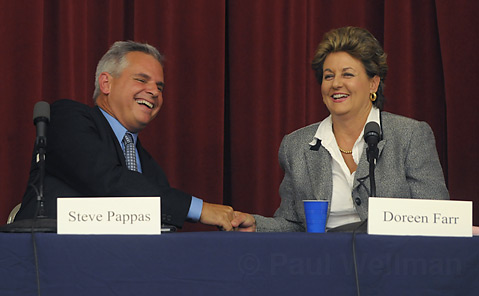
Show Me The Money
Crawford-Hall has become quite a colorful character in the Santa Ynez Valley since inheriting her family’s large, historic ranch a decade or so ago. The San Lucas Ranch, one of the largest in the county, has been in the Crawford family for four generations. Unlike her predecessors, Crawford-Hall has used her position in the county to actively further a number of causes, including the candidacy of Pappas.
In 2006, she purchased the Santa Ynez Valley Journal for an undisclosed amount from Jim Buckley, owner of the Montecito Journal. She turned the monthly into a weekly and has used it as a personal soapbox in her column “On the Ranch” (or “On the Rant,” as her critics call it). A well-respected horse breeder, she often writes about her horses or generalizes about a personal dislike — “Americans don’t know how to drive through roundabouts” is one example from a recent column, apparently discounting all the New England states, among others — but she often also voices her opinions on political topics. These opinions are certainly eclectic, and often appear under-researched. A strong supporter of property rights, she fights any expansion by the Chumash tribe of its casino; she hates environmentalists, calling them eco-Nazis, yet loves nature and placed 1,534 acres of her ranch into a conservation easement, stating that the land along Highway 154 will forever remain the way it is today. “That might be as big as anything anyone has ever done for the valley,” said one valley resident, Bob Field.
Crawford-Hall, who did not return the repeated calls and emails of this reporter, believes her newspaper acts as a balance to the rest of the liberal media — notwithstanding Wendy McCaw’s News-Press. Reportedly ruling the paper with an iron hand, Crawford-Hall has gone through five editors in five years. She gave the staff a hard time for putting Farr on the cover after Farr won the election, and her column — which isn’t allowed to be touched by editors — often hints at blowing the lid off the shenanigans of the 3rd District race. (“Stay tuned for the answer,” “Storm Clouds Gathering,” “Stay tuned. It’s going to get exciting. Get ready!” are just some examples). “We see a lot of allegations but never any evidence or facts,” said county elections officer Alvarez.
Pappas called Crawford-Hall a “true, pure American” who loves to make wrongs right. “She gives and gives and gives and gives for the public and doesn’t ask for anything,” he said. She certainly gave and gave to Pappas, having contributed $400,500 to his campaign since the beginning of 2008. This includes $278,000 since the actual election, which has been a significant factor in his legal battles.
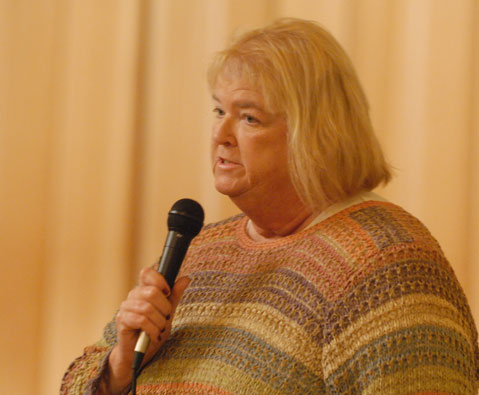
Court Case
As time was of the essence, the courts expedited Pappas’s lawsuit, allowing it to go to trial in early February before Judge William McLafferty. Pappas intended to show widespread voter fraud — that voter registration cards were not properly filled out, were turned in late, and that the Elections Office had erred. As part of his evidence, his lawyer, Jeffrey Lake, put a 19-year-old SBCC student on the stand. At one point, McLafferty interrupted the testimony to ask her if she was allowed to vote for the candidate of her choice, and if, to the best of her knowledge, that vote counted. She answered yes to both. Pappas offered no other evidence of any other person attempting to vote using that person’s name, or any attempt to interfere with her vote, despite the student’s suggestion the signature on her voter registration was not hers.
That was enough for McLafferty, who would eventually write in his opinion dismissing the election contest that the allegations made by Pappas were “frivolous and tantamount to an intentional misleading of the Court.” He said the goal was not to disenfranchise voters due to technicalities, but to ensure everyone who wanted to had the chance to vote. It was a legal smackdown from the judge.
And still Pappas was not satisfied.
He appealed McLafferty’s decision to an appellate court. The appellate court not only agreed there was no evidence of voter fraud but also overturned another decision from McLafferty and awarded attorneys’ fees to Farr. Two courts, two smackdowns.
And still Pappas was not satisfied.
Farr, despite victory at every legal level, has not received a dime from Pappas for her growing legal fees. A hearing on that matter is set for next month.
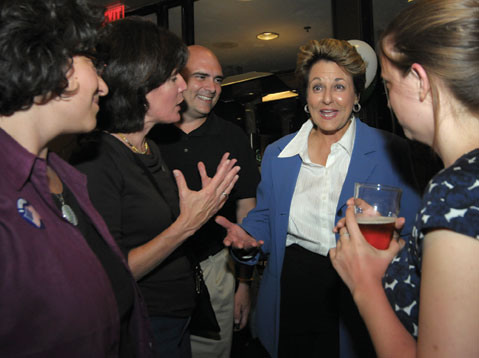
It’s Not Over ‘Til… It’s Over
Still, Pappas and Crawford-Hall press on. He admits that he lost the lawsuit, but is determined to stop voter fraud. “It’s factual,” Pappas said. “It happened.” Recently, he and Crawford-Hall have been pushing a report from the Santa Barbara Sheriff’s Department, which he says contains proof fraud was committed. The report provided by Pappas to the public has one line that states “there appears to be evidence that numerous violations of the California Elections Code took place.” The document, however, is mostly redacted (crossed over in black ink), and no supporting evidence for that statement is provided. The California Secretary of State declines to comment even on whether or not they are investigating something, but Pappas maintains the investigation is “ongoing and growing.” He refuses, however, to say what, exactly, is being looked into, who is named, and what is alleged. “If they had evidence of something criminal, why would you wait until you lost the lawsuit?” Alvarez asked during a recent interview.
In the last few months, Crawford-Hall and Pappas produced a snazzy Web site (stopvoterfraud.info), complete with an eight-minute video explaining exactly how voter fraud takes place. The video, which popped up on the Internet about four weeks ago and has been pushed by Crawford-Hall in her weekly column, is free of propaganda and bias, Pappas said, and just full of facts.
Complete with dramatic music and testimony often taped behind shadow screens obscuring the interviewee’s identity, the video features Terry Baxter, personal assistant to Pappas, standing in front of a green screen on UCSB’s campus, acting as a reporter. The script outlines how, when a third party registers someone, most commonly a student, they take the registration card back from the student, allowing that unnamed third party to do whatever they’d like with the cards, leading to fraud. “We’re just trying to close the loophole,” Pappas said. Alvarez, however, contested that, saying any irregularities — whether a person votes twice or doesn’t get to vote at all — are flagged and carefully checked until the issue is resolved. She added that there are more measures than ever to avoid fraud.
Onlookers have speculated that Crawford-Hall and Pappas are using this case as a tactic to talk about Farr at redistricting hearings and to put the stink on Isla Vista voting habits. Crawford-Hall has not been a fan of I.V.’s presence in the 3rd District. “[Pappas] and the people who support him have a real problem with students voting,” Farr said. “Maybe it’s not because they vote; it’s how they vote.”
Farr’s camp also has been wondering if Pappas’s case is really about spending money to intimidate voters from voting, instilling fear that their vote will not count, their identity will be stolen, or they will face a subpoena, and to intimidate potential candidates from running, for fear of postelection legal bills. “It’s all geared toward fear and making people afraid,” former 3rd District Supervisor Gail Marshall said.
For Farr, the last 30 or so months have been, in a word she used several times in a recent interview, “frustrating.” She says she has done her best to put the case aside and focus on constituency services, policy-making, and the busy days and nights that go into being a supervisor, but with a legal bill of $552,510 and another potential election around the corner in 2012, it’s been stressful. “Despite it all, I’ve managed to stay focused,” she said. She’s had widespread support from across the district, including from Pappas supporters who “did not support what he has done,” she said.
It’s difficult enough for people to run for office, but to have to defend an elections process a candidate has nothing to do with simply because they choose to run is not right, Farr said. “It’s going to have a more chilling effect on people’s decision to run,” Farr said. Ironically, Pappas himself said Farr shouldn’t be responsible to defend against accusations thrown at others. “It should not be the only option you have,” he said. “It’s absurd, antiquated, and should be changed.” Farr has been in touch with Assemblymember Das Williams, asking him to introduce legislation that would amend the Election Code “so nobody else has to go through this.”
Despite the tough two-and-a-half years following a tough campaign, Farr doesn’t regret running. “Santa Barbara County is such a special place and filled with so many wonderful people,” she said. “It really is an honor to represent it.”



